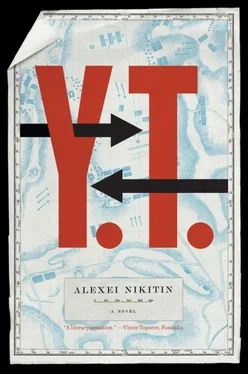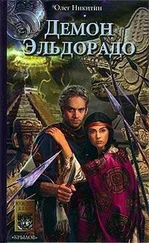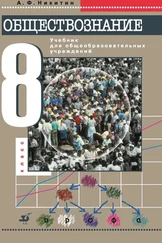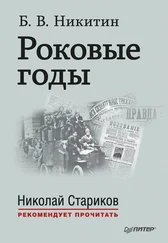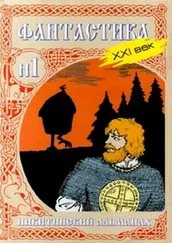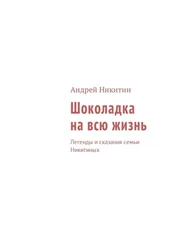I was standing opposite Castle Hill, but the hill was already disappearing into night—I could make out only its silhouette—and beyond the hill, beyond Podol, in the Kurenyovka district, was the hospital where Reingarten was kept, where I hadn’t gone to see him. On that May day, he also believed we had won.
My mobile was vibrating in my jacket pocket.
‘Have you really been sleeping all day?’ Vera asked.
‘No, I didn’t sleep in.’
‘Then why didn’t you call?’
‘I thought you were sleeping. I didn’t want to wake you.’
‘Yes, I was sleeping,’ she said contentedly. ‘Until lunch. But now I’ve caught up. And do you know what I did when I woke up?’
‘What did you do?’
‘I called Natasha née Belokrinitskaya.’
‘What for?’ I was surprised.
‘Just because. To make sure her number hadn’t changed. After all, I said I’d give it to you.’
‘Thanks. Although I don’t think I’ll have any use for it now. How is she?’
‘She has no complaints. She remembers you, and the others, too. And you know what else she said? That she was the one who sent that letter to Kurochkin and the rest of you. With the ultimatum.’
‘Natasha? But why?’ I looked, but Sinevusov had already vanished into the darkness. I had no intention of telling him anyway.
‘No special reason. She was just having a bit of fun. She wanted to play a joke on you all.’
‘Really?’ I asked stupidly. ‘A joke? It was one hell of a prank.’
‘She was going through some old papers a few months ago and came across the draft ultimatum. It made her think about old times, lost youth and all that, so she typed up the text. And when she came to the date, well, exactly twenty years had passed, so she wrote an e-mail, sent it to Kurochkin and copied it to the rest of you.’
‘Astonishing.’ I shook my head, great big drops of water flying off of me just like Sinevusov’s dog. ‘It’s the most brilliant practical joke I’ve ever heard of.’
‘I told her that. I said that over here people had taken her joke very seriously and that Kurochkin had jumped ship altogether and hightailed it to the Holy Land. To atone for his sins. Isn’t that right?’
‘That’s it exactly. You’ve captured the nuances very well.’
‘Don’t tease. So where are you?’
I looked at the empty rain-filled streets of the neighborhood.
‘The center, Vera. I’m in the center without a car. Are you at home?’
‘Yes, at home.’
‘Never mind, I’ll think of something.’
‘Have a think,’ said Vera easily. ‘I’m sure you’ll think of something.’
Our talk was long overdue. We should have spoken before all the madness in the hours before his departure when he’d started sending me terse e-mails asking me to get in touch urgently. Or later, after I’d talked to Sinevusov, and Kurochkin had already gone and stopped making demands. There had been plenty of time to dial his number, but still I put it off.
Ten days after our return from Crimea Vera left as planned to spend a year in Germany. I’d already received her first letters. After the buzz of life in Kiev, so bright and busy, she was finding it hard to get used to the quiet, deliberate, unhurried way of life in Lindau—twenty minutes from Hettingen, an hour from Hanover and two hours from Frankfurt.
Even before Vera left an e-mail had arrived from Natasha. I opened it with a superstitious shudder that surprised me. This Hotmail address was all too familiar. It was from this address that the letter signed by Emperor Karl had come on 9 March. It was difficult for me to read it; I’m sure it was no easier to write it.
‘I could hardly believe that what I’d thought was such a harmless little joke could set such events into motion,’ she wrote.
I have to admit that I didn’t believe Vera at first. I thought you just wanted to play a joke on me in return. It wasn’t until I’d gone through dozens of Ukrainian news sites that I could see she wasn’t making it up. And she might not have told me everything at that. Vera asked me to tell you how I got hold of the text. There’s not a lot to say. Korostishevski had borrowed my notes on the history of the party (I can’t even remember any more which of these words is capitalized—or perhaps they both are?) and misplaced them. He looked for them, but when he couldn’t find them he thought they must be in the folder Nedremailo had taken from him. It was obviously going to be easier for me to talk to Nedremailo—he was a relative after all, and we’d always got on well. Can you imagine how surprised I was when Nedremailo wouldn’t let me look in the folder, not even in his presence? He just said my notes weren’t there and told me to stop playing games with him. I remember being astonished and full of indignation at the time, and I decided to take a look myself. I staged quite a production to get my hands on that folder. I went back one morning a few days later. The only person at home was his wife, Elena Vasilievna, Vera’s mother. To distract her I asked my mother to give her a ring at a prearranged time. While they were chatting I found the folder and went through everything inside it. He was right when he said my notes weren’t there. I’d gone to such lengths and all for nothing. Then I took out one of the drafts of the ultimatum—there was more than one in the folder—and a couple of pages copied from a collection of pre-Revolutionary documents. As a trophy. I looked at it more carefully when I got home. It was the ultimatum made by Austria-Hungary to the Serbs in July 1914. Korostishevski had just amended it a little.
Then you all were arrested, and I was left without my notes. I should mention that Nedremailo figured out I’d been rifling through the folder, but he never mentioned it. And that’s the whole story.
‘You know, Alex,’ Natasha went on, and I really felt that I could hear her voice,
I’ve been thinking about all of you quite a lot of late, the way you were all chasing after me, trying to not give yourselves away but trying to get my attention at the same time. Usually we reminisce when things aren’t going too well—although things are going quite well for me—but it’s not nostalgia either. Far from it. It’s just that it was such a long time ago. Rather, it seemed like such a long time ago, I felt sure of that. But, you see, time has ended up being finer than a thin sheet of paper. It only takes a little pressure and, there you go, the past is right beside you. Maybe time isn’t real at all. Maybe we’ve only invented it.
Kurochkin rang. In the morning the phone began tinkling delicately. I picked up the receiver and he said, ‘Hi, Alex, how goes it? Kurochkin here.’
‘Hi, Kurochkin. Every day I’ve been meaning to call you…’
‘How could you? I’ve changed my numbers. I’ve changed everything—from my wife to my country. Just joking. A new and wonderful life is just waiting.’
‘Why change everything? What with your parliamentary immunity—’
‘Davidov, don’t start. I’ve already thought, changed my mind and changed my mind again. Of course, I could have stood my ground and fought back, I could have pulled rank, but what for? They would have crushed me all the same. And it would have been more painful. For me and everyone around me, including you. In short, I’m okay now. What about you? I looked for you before I left. I wanted to tell you it was all off—the searches, investigations, all those letters, ultimatums—it’s a false trail, a deception. I wanted to tell you to lie low for a while until everything got back to normal, to go away somewhere. So, then, how are you doing? What have you been up to?’
‘Well, I’m not selling water any more if that’s what you want to know.’
Читать дальше
